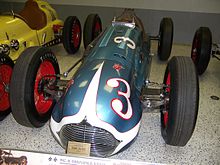Maurice "Mauri" Rose (May 26, 1906 – January 1, 1981) was an American racing driver. He won the Indianapolis 500 in 1941, 1947, and 1948, becoming the race's third three-time winner. He also won the AAA National Championship in 1936.
Driving career
Indianapolis 500 career

Although Rose had driven in every Indianapolis 500 since 1933, he earned his first pole position when he put his Maserati on the pole for the 1941 Indianapolis 500; but spark plug problems sidelined his car after sixty laps. He then took over the Wetteroth/Offenhauser car being driven by Floyd Davis that had started in 17th place. Rose went on to win. In 1947 and 1948, Rose captured back-to-back Indianapolis 500s driving one of the Deidt/Offenhauser Blue Crown Spark Plug Specials, owned and prepared by veteran driver/car owner Lou Moore.
Late in the 1947 race, Rose found himself lying second to his rookie teammate, Bill Holland, when both were given a sign reading "EZY" from pit lane. Holland reduced speed, but Rose ignored the sign and continued on. Rose closed on Holland and to his amazement, Holland gave way without a battle and even gave Rose a friendly wave as he went past on his way to victory. But Holland thought he had more than a lap lead on Rose, instead of just a few seconds. Holland was furious afterward.

In 1949, with Holland leading and Rose again running second late in the race, Rose set out to overtake his now-veteran teammate. Rose again ignored car owner Lou Moore's "EZ" signs from the pits and continued to push in pursuit of Holland. This time, Rose's car broke while Holland cruised home to victory—and Moore fired Rose on the spot after the race for disobeying team orders.
Rose made his fifteenth and final Indianapolis 500 start in the 1951 race. Knocked out from an accident after 126 laps, the forty-five-year-old Rose retired to a home in California. For the 1967 race, officials of the Indianapolis Motor Speedway invited him to drive the pace car.
World Drivers' Championship career
The AAA/USAC-sanctioned Indianapolis 500 was included in the FIA World Drivers' Championship from 1950 through 1960. Drivers competing at Indianapolis during those years were credited with World Drivers' Championship points and participation in addition to those which they received towards the AAA/USAC National Championship.
Rose participated in two World Drivers' Championship races at Indianapolis. He finished in the top three once, and accumulated four World Drivers' Championship points.
Post-driving career and life
Rose worked for General Motors both during and after his racing career. He was heavily involved in the development of the Chevrolet Corvette into a competitive racing machine.
Both of Rose's children were disabled by polio. While his career in racing was filled with success, he considered his most important accomplishment to be his invention of a device that made it possible for those without the use of their legs to drive an automobile.
Awards and honors
Rose has been inducted into the following halls of fame:
Rose has been awarded the following honors:
Motorsports career results
AAA Championship Car results
1
3
4
23
12
2
6
DNP
1
DNP
1
13
3
14
Indianapolis 500 results
FIA World Drivers' Championship results
(key) (Races in bold indicate pole position, races in italics indicate fastest lap)
3
14
Original Wikipedia article last retrieved on 10 January 2024.